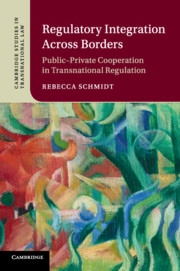Book contents
- Regulatory Integration Across Borders
- Cambridge Studies in Transnational Law
- Regulatory Integration Across Borders
- Copyright page
- Contents
- Figures
- Acknowledgements
- List of Abbreviations
- Table of Cases and Legislation
- List of Organisational Documents
- Introduction
- 1 Setting the Scene
- 2 Regulatory Interactions as a Means to Manage Authority in a Complex Transnational Context
- 3 Integration, Networks and the Global Order
- 4 ISO 26000: Regulatory Cooperation in a Fragmented Field
- 5 Case Study on Sport and the Environment
- 6 Reassessing Cooperation
- Bibliography
- Index
- Cambridge Studies in Transnational Law
2 - Regulatory Interactions as a Means to Manage Authority in a Complex Transnational Context
Published online by Cambridge University Press: 03 December 2018
- Regulatory Integration Across Borders
- Cambridge Studies in Transnational Law
- Regulatory Integration Across Borders
- Copyright page
- Contents
- Figures
- Acknowledgements
- List of Abbreviations
- Table of Cases and Legislation
- List of Organisational Documents
- Introduction
- 1 Setting the Scene
- 2 Regulatory Interactions as a Means to Manage Authority in a Complex Transnational Context
- 3 Integration, Networks and the Global Order
- 4 ISO 26000: Regulatory Cooperation in a Fragmented Field
- 5 Case Study on Sport and the Environment
- 6 Reassessing Cooperation
- Bibliography
- Index
- Cambridge Studies in Transnational Law
Summary
- Type
- Chapter
- Information
- Regulatory Integration Across BordersPublic–Private Cooperation in Transnational Regulation, pp. 34 - 70Publisher: Cambridge University PressPrint publication year: 2018

